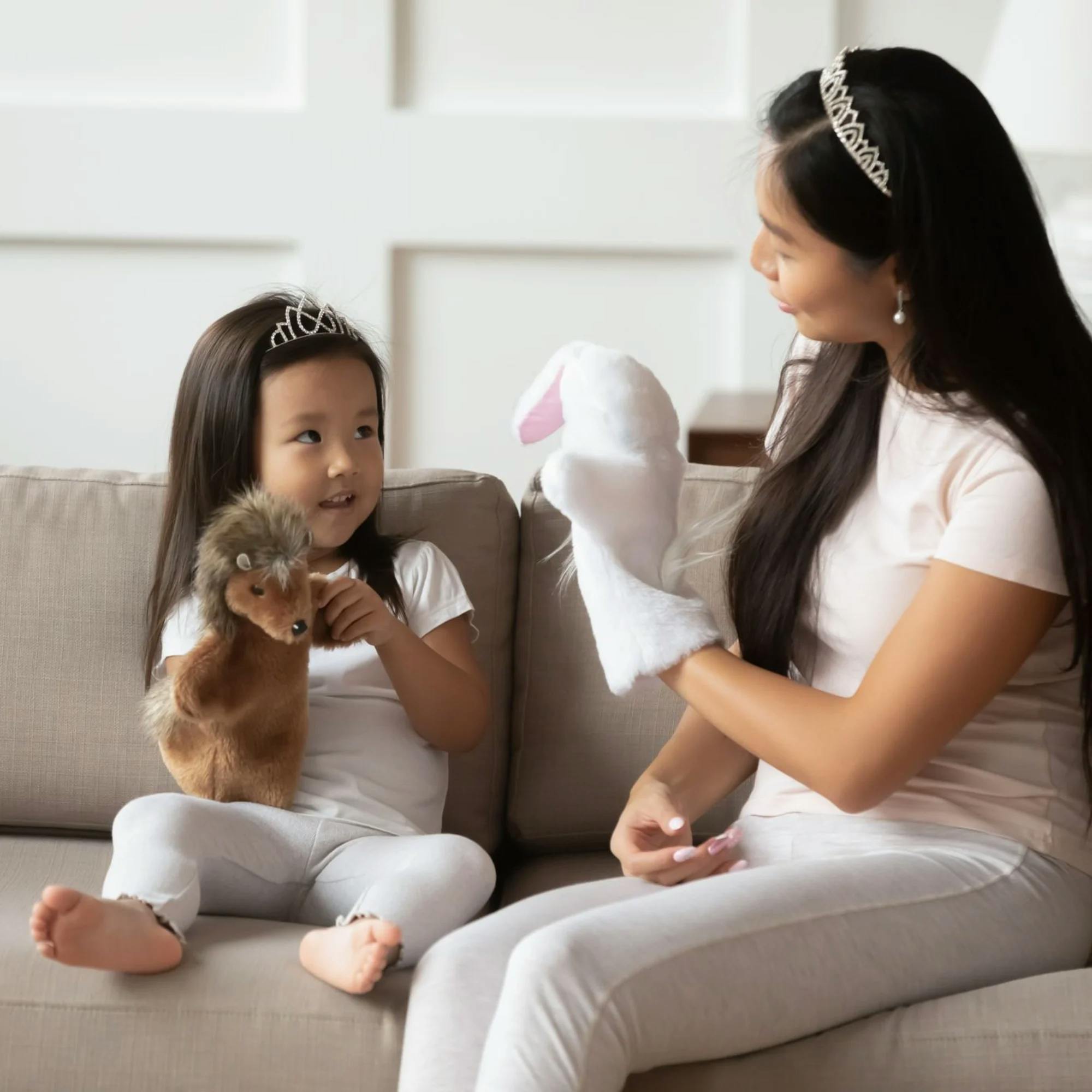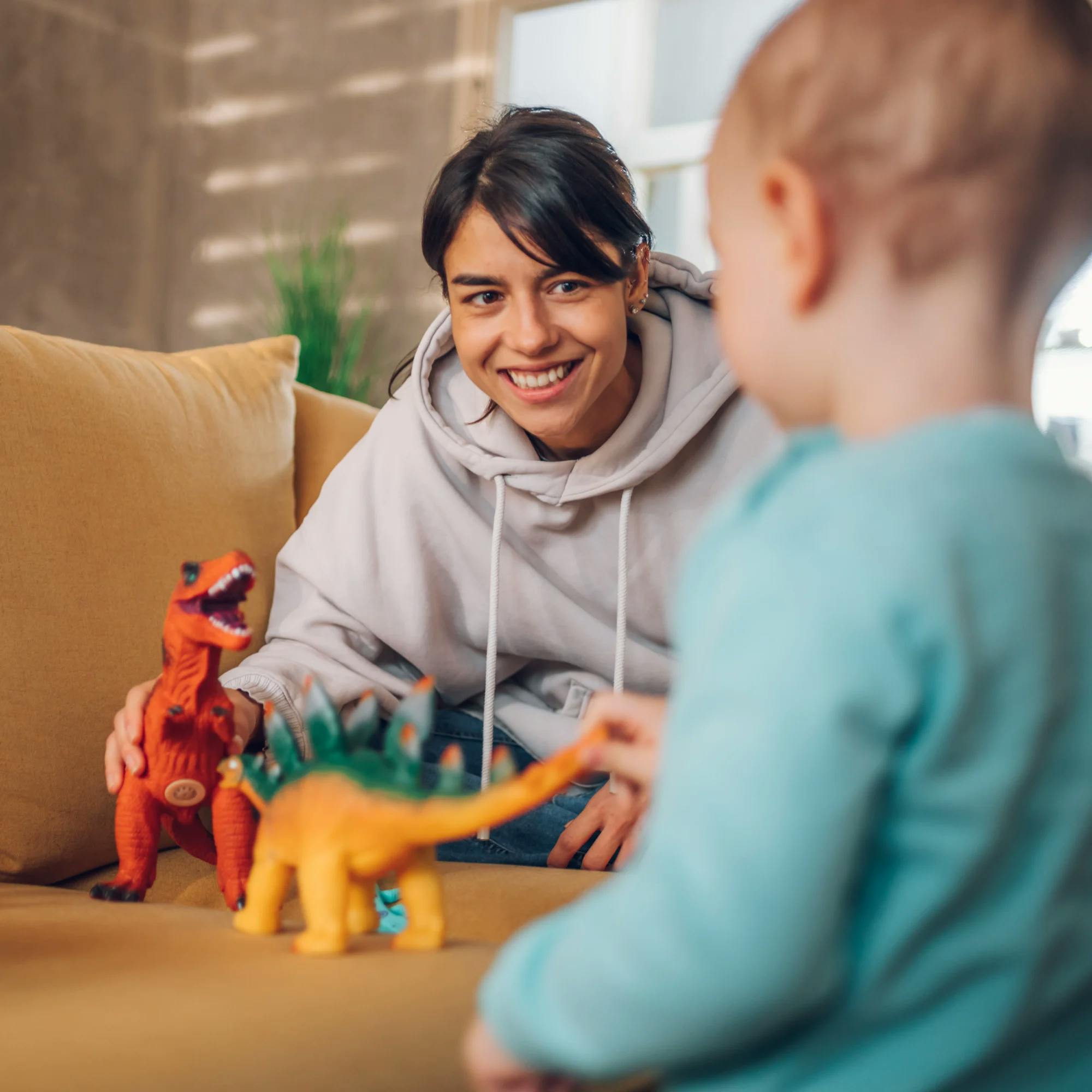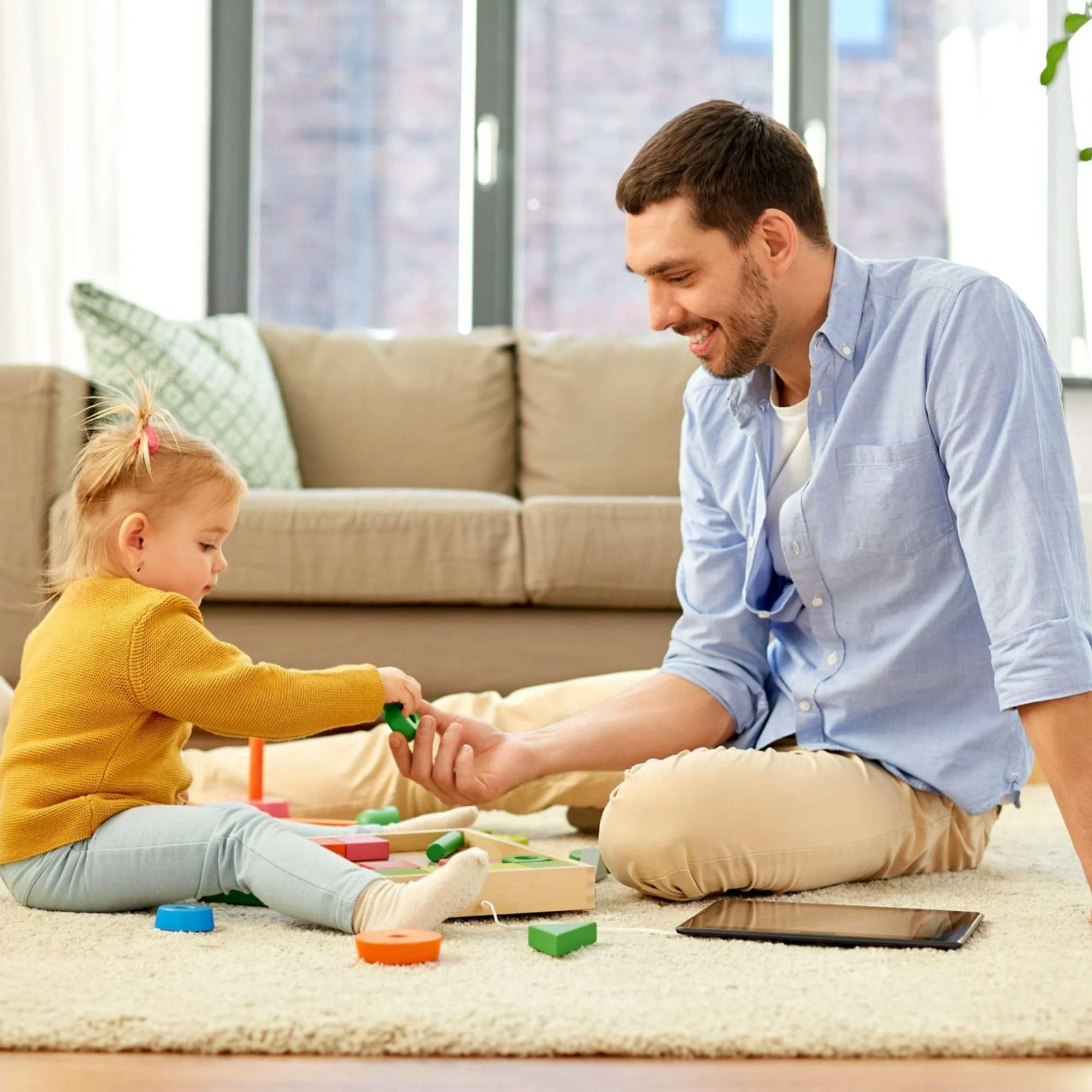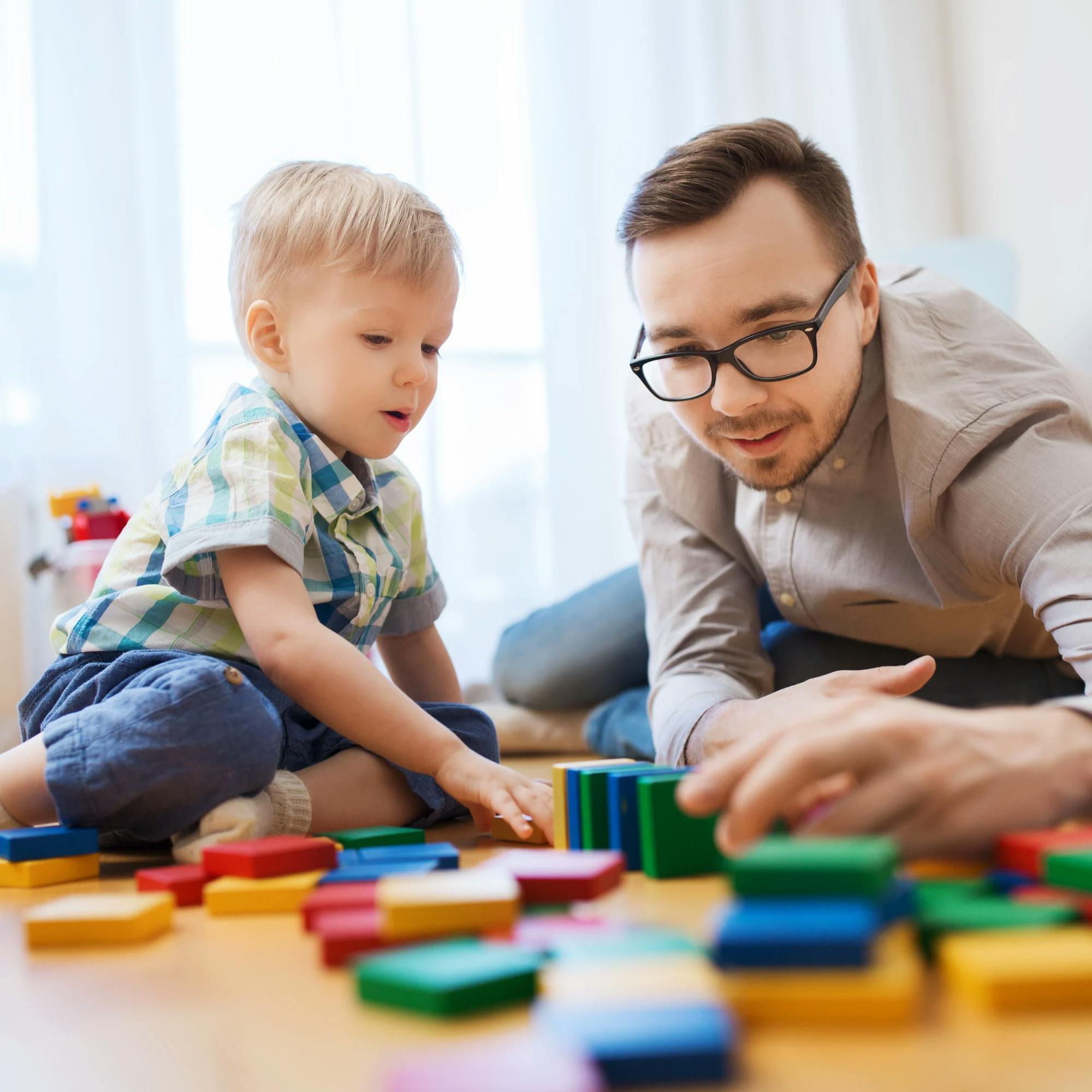
10 Fun Activities to Boost Your Toddler’s Language Development
 Leanne Sherred, M.S., CCC-SLP
Leanne Sherred, M.S., CCC-SLP
Every time a child cries, points, makes eye contact, or uses a facial expression, they’re communicating with language. Maybe they’re hungry, upset, or excited. This nonverbal communication is a great sign! As parents, it’s our job to notice and encourage it, helping set the stage for even more communication growth.
If you're helping your toddler learn to talk--or use more words--one of the best ways to do that is through play. Speech therapists recommend these 10 fun, easy language activities you can use at home. Let’s jump in!
Is your child on track?
Take our free screener to learn more about your child's development and whether a speech evaluation is recommended.
 Screener for children
Screener for children1. Make animal sounds
What do children love even more than animals? The sounds that animals make! Cut out pictures of animals from magazines or print them out. Take turns showing these pictures to your child and either (1) make the sounds yourself, or (2) have your child mimic the sounds.
If you’re feeling really creative, act out the animals as well. You can stick your tongue out and go “woof woof” like a puppy, or get on all fours and say “bahhhh” like a sheep.


2. Play the Telephone Game
This perennial favorite should be an active part of playtime. You can get a toy telephone or, if you're feeling ambitious, make and decorate one to appeal to your child’s imagination. Pretend that the phone is ringing and have your child “answer.” Whether they’re just babbling into the receiver, or perhaps using simple language like “hello,” this activity will help set the foundation for early conversation skills.
3. Sing songs
From “Itsy, Bitsy Spider” to “The Wheels on the Bus,” children love singing simple songs and nursery rhythms. Not only do they provide some great family bonding time, but songs can build vocabulary and help children learn and recognize the natural rhythm of speech. Best of all, there are so many opportunities to break up boring activities with enjoyable songs, such as during long car rides or bath time.
Check out this quick video from one of our speech therapists to see how to use songs for language growth!
4. Build a tunnel for cars
All you’ll need is some paper, tape, and toy cars, trucks, or trains. Bend or fold the paper in half so it makes an arched or pointed shape. Then, tape the sides of the paper to the floor to make a tunnel. Now drive the cars through!
There are lots of things to talk about during an activity like this. Here are some words you can teach your toddler while you play:
Spatial concepts, like “under” and “through”
Item names and sounds, such as “car – beep beep” and “train – choo choo!”
Descriptive words, like “fast/slow” and “big/small”
5. Label objects
It’s important to remember that everyday activities, such as going for a walk, brushing teeth, and prepping for bed, are all opportunities to use language. One simple way to do this is to name objects around you and have your child practice repeating new words.
While you don’t want to overwhelm your child with new vocabulary every waking moment, try to find ways to introduce them to certain types of words in each location. Make it fun! For example, next time you go to the grocery store, focus on labeling vegetables. Or when you go outside for a walk, point to and name different types of plants or cars.

6. Put on a puppet show
Who doesn’t love a good old-fashioned puppet show? Not only will your child have a blast decorating their puppets--brown lunch bags and googly eyes, anyone?--it’s a great way to strike up a mock conversation between two lovable characters. Your puppet can ask your child’s puppet all sorts of questions, using fun and imaginative voices of course.
If your child has started to speak, encourage them to respond in full sentences when you ask them a simple question. This will help your child string words together and better express their thoughts. For example, let’s say your puppet asks, “Want to go outside?” If your child would normally nod their head, or give you a simple “yes,” repeat back to them: “I want to go outside.”
7. Curl up with a book
It’s hard to overstate the importance of reading--even with babies and toddlers. Children take the first steps toward reading and writing in infancy, so it’s important to establish a reading routine and build good habits that will last them a lifetime. Make reading enjoyable by choosing fun books that stimulate their imagination.
For youngsters, make sure to point to and label the pictures, saying, for example, “dog.” You can even ask questions like, “What sound does a dog make?” This will improve your child’s comprehension and expand their vocabulary. Check out this quick video, where one of our speech therapists demonstrates a few of these tips with a favorite board book for toddlers!


8. Practice speech sounds with I Spy
Here's a fun way to help your child learn speech sounds. Put a few common, everyday items on the table. Let's say you choose a toy car, an orange, a block, a cup, and a spoon. Next, say to your child, “I spy something that starts with ‘bbbbb.’” Really exaggerate your sounds and give your child enough time to find the item that starts with the matching letter--in this case, a block. Be sure to encourage your child and give them a little help if needed. This game helps expand your child’s vocabulary and gives them a chance to make associations between sounds, words, and objects. And of course, if your child guesses the right item, make sure to congratulate them! This positive reinforcement will help them feel more confident.
9. Play What's in the Box?
For older children, fill a bag or box with mystery items. Have your child reach their hand inside (without looking) and try to guess what’s inside, using nouns and adjectives to describe what it feels like. “It’s hard, round, and small--is it an apple?”
Quick speech therapy demo: Try this, not that, to help your toddler learn to talk!
Watch here10. Play with toys appropriately (and watch imagination soar!)
It's important to help your child learn how to play with toys appropriately. Babies may simply bang toys together or look at them. However, as they grow older, they should begin to use toys for their intended purpose.
Take the example of a toy spoon and bowl. We want children to learn how these two objects go together. They can pretend to mix the spoon in the bowl, or sip the spoon as if they're eating soup.
Playing appropriately with toys also helps toddlers gain imaginative play skills. As they grow, they can pretend to do things like make food, build a garage out of blocks, become a firefighter--the opportunities are endless! And this imaginative play opens the door for them to talk about what they're doing. There is much more a child can comment on during imaginative play. For example, when they play with pretend food, they can "feed" their stuffed animals or baby dolls. They may say things like, “Yum!” or “Eat!”
The takeaway? Imaginative play gives your child more chances to say more words.
How to know if your toddler needs speech therapy
If you're concerned that your child isn't talking as much as other kids their age, consider talking with a speech-language pathologist. Speech therapists are communication experts, and they'll work with you and your child to evaluate, diagnose, and treat a potential speech delay, language disorder, or other communication challenge. Early intervention speech therapy for toddlers makes a big difference! There's no reason to wait if you think your child might need help. Take our free online screener to find out if an evaluation is recommended for your toddler. Or, click here to get matched with a speech therapist who's right for your family.
How Expressable Can Help
Concerned your child isn't reaching age-expected milestones? Looking for communication support from a professional? Expressable is a national online speech therapy practice serving children and adults. We treat all major areas of communication and feeding, offer flexible hours including evenings and weekends, and accept most major health insurance plans. We’re proud to have earned more than 3,000 5-star reviews from our clients (4.9/5 average).
Our therapy model is centered on parent and caregiver involvement. Research proves that empowering caregivers to participate in their loved one’s therapy leads to better outcomes. That’s why we combine live, 1-on-1 speech therapy with personalized education and home practice activities for faster progress.
Communication is more than words. It’s how we share how we feel and show who we are. We’re here to help you or your child do just that.












